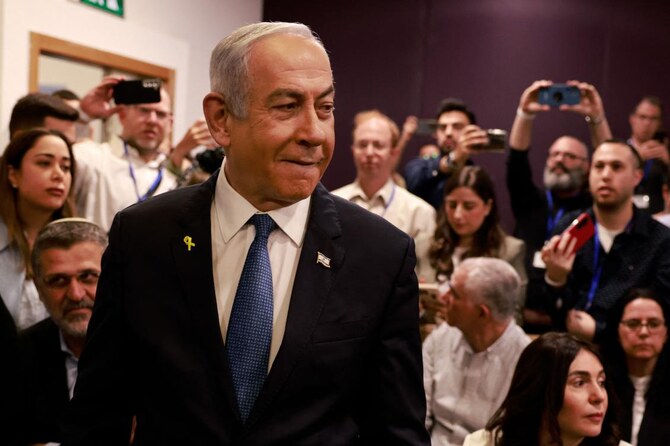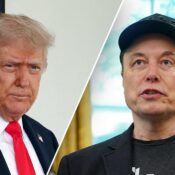
Netanyahu attacks the media during his first appearance as a witness in his corruption trial
During his first appearance on the witness stand in his protracted corruption trial on Tuesday, Israeli Prime Minister Benjamin Netanyahu claimed he was being stalked because of his aggressive security measures.
Netanyahu, 75, is the first prime leader of Israel to face criminal charges while in office. He is testifying while Israel fights a war in Gaza and faces potential new threats from regional unrest, particularly in Syria.
Judges last week ordered Netanyahu, who was accused in 2019, to testify three times a week, requiring the longstanding Israeli leader to alternate between the courtroom and the war room at Israel’s Defense Ministry, which is only a short distance from the courthouse.
Netanyahu, the head of the right-wing Likud party, attacked the Israeli media for what he saw as their leftist viewpoint and said that they had harassed him for years because his policies had conflicted with the movement for a Palestinian state.
The three-judge court heard Netanyahu’s statement, “I have been waiting for this moment to tell the truth for eight years.” However, I am also prime minister. The nation is going through a seven-front war under my leadership. I also believe that the two can be completed simultaneously.
In exchange for favorable coverage of himself and his wife Sara on a news website run by the former head of the company, Netanyahu is accused by prosecutors of giving regulatory benefits to Bezeq Telecom Israel (BEZQ.TA) totaling approximately 1.8 billion shekels, or $500 million.
He is also alleged to have negotiated a deal with the proprietor of the Yedioth Ahronoth daily in Israel, offering improved coverage in exchange for laws that would impede the expansion of a competing publication.
In his not guilty plea, Netanyahu refutes the accusations made against him. He did not sit in the witness box during his morning testimony; instead, he stood.
“All I would have needed to do if I wanted decent coverage was to hint at a two-state solution…. He remarked, “I would have been hailed if I had taken two steps to the left.”
He presented himself in long responses as a resolute supporter of Israel’s security, despite pressure from hostile local media and foreign forces.
EXPERIENCE IN THE UNDERGROUND ROOM
Netanyahu arrived to the Tel Aviv District Court at around 10 a.m. (0800 GMT) with a confident smile. For unknown security considerations, the trial was rescheduled from Jerusalem to an underground courthouse.
Netanyahu’s attorney, Amit Hadad, presented the judges with what the defense claims are serious weaknesses in the inquiry prior to Netanyahu’s testimony. The prosecution “weren’t investigating a crime, they were going after a person,” Hadad stated.
Some supporters and others who were calling for him to do more to negotiate the release of the approximately 100 hostages that Hamas still holds in Gaza were among the dozen protestors who gathered outside the courthouse.
Netanyahu has been given a reprieve to begin his court appearances during the more than one year that Israel has been fighting the Palestinian militant Hamas in Gaza. Judges, however, ordered him to begin testifying last Thursday.
According to the court, Netanyahu will testify three times a week on charges of bribery, fraud, and breach of trust, even in light of the Gaza conflict and potential new dangers brought on by the broader unrest in the Middle East.
In three incidents, Netanyahu was charged with accepting gifts from his billionaire pals and allegedly soliciting regulatory favors for media tycoons in exchange for positive press coverage. There is nothing wrong with him.
Before his court appearance, Netanyahu resurrected his old anti-law enforcement rhetoric from before the war, calling the investigations against him a witch hunt. He entered a not guilty plea and disputes the accusations.
Disparities within the Israeli population
Prior to the conflict, Netanyahu’s legal issues caused a great deal of division among Israelis and rocked Israeli politics during five election cycles. Israelis became even more divided when his government attempted to limit the judiciary’s authority last year.
Netanyahu’s trial was washed from the public consciousness by the October 7, 2023, shock Hamas attack on Israel and the subsequent war in Gaza, when Israelis united in anguish and loss. But political unity disintegrated as the battle continued.
While combat slowed on one front in recent weeks following a truce agreement between Israel and Hezbollah, the Lebanese ally of Hamas, Netanyahu’s cabinet members, especially his ministers of justice and police, have clashed with the court.
An arrest order issued by the International Criminal Court (ICC) for him, his former defense chief Yoav Gallant, and a Hamas leader for alleged war crimes in the Gaza battle last month further exacerbated his domestic legal troubles.
All Categories
Recent Posts
Tags
+13162306000
zoneyetu@yahoo.com



